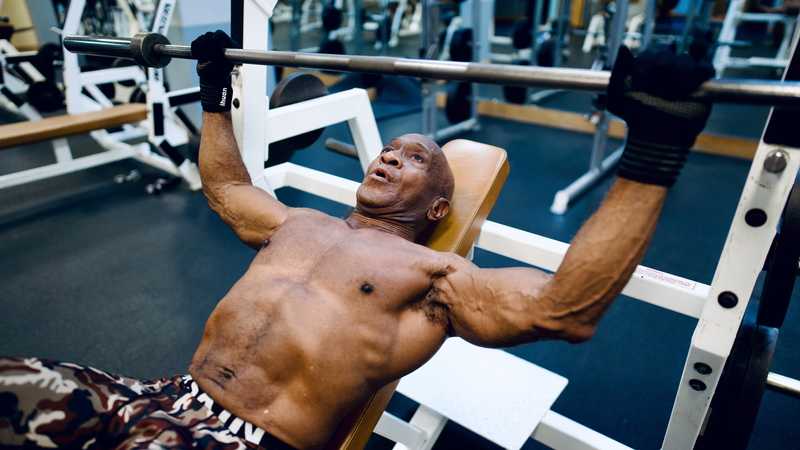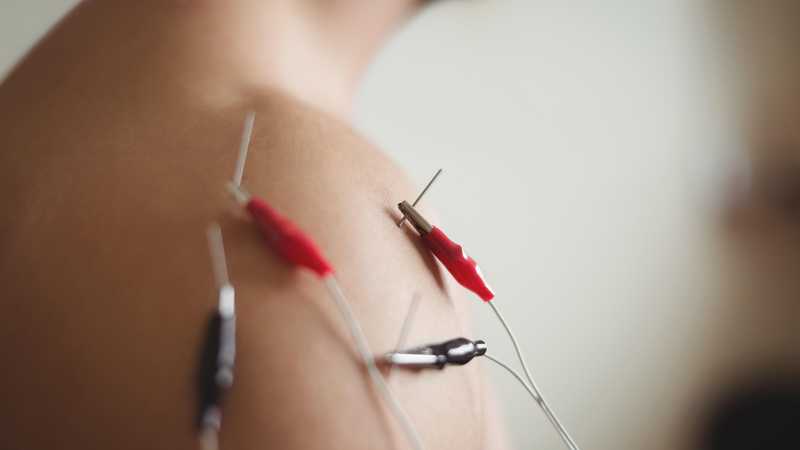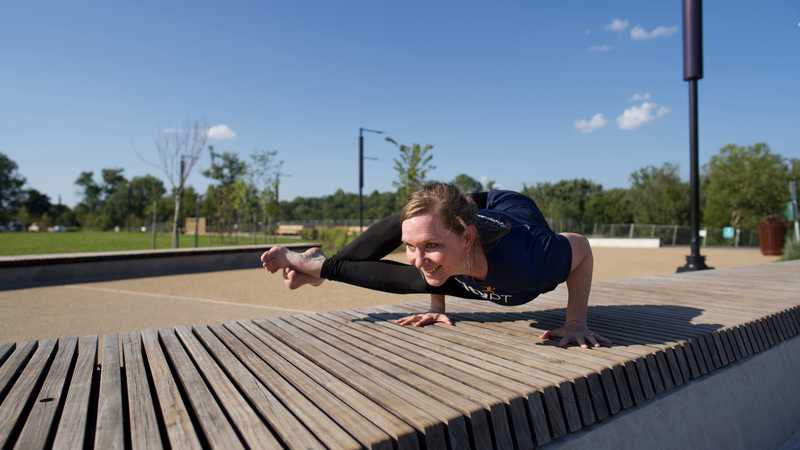Are you struggling with shoulder pain radiating down your arms to your fingers? This type of pain can be both discomforting and frustrating, especially when the pain affects sleep or your day-to-day activities.
Often, this type of pain is not caused by the shoulder at all but by compression of nerve roots in the cervical spine. Alternatively, nerve irritation in the cervical and brachial plexus area can also cause shoulder pain that radiates into the arm and fingers.
This article will cover some medical conditions and other issues that could be the cause of your shoulder pain. Finally, we'll offer some exercises that can help relieve it.
Quick Answer: What It Means When You Have Shoulder Pain Radiating Down Your Arm to Your Fingers
When you have shoulder pain that radiates down your arms to your fingers, you may have a medical condition, the most common being a pinched nerve.
If you have weakness, numbness, or are feeling pins and needles, you may have pinched or inflamed nerves in your neck, shoulder, or upper chest area.
Key Takeaways
- You could have a medical condition that's causing the pain.
- Your sleeping habits or an injury could also be the cause.
- We've outlined some exercises that you can do to strengthen your shoulder and neck muscles to relieve pain from a pinched nerve.
Table of Contents
- Types of Medical Conditions That Could Be Causing This
- Other Common Conditions That Could Be Causing This
- Could This Be Caused by a Pinched Nerve?
- Exercises That Can Be Done To Alleviate This
Types of Medical Conditions That Could Be Causing This
A few medical conditions can cause shoulder pain that radiates down your arms to your fingers. Sometimes, it can be normal aging or even overuse that can cause stress and pain in the shoulder. Or it can be an underlying injury that's causing the pain.
More often, it can be an inflammation of a nerve, vein, or artery that is giving you trouble. Let's look at some of the medical conditions that could be to blame for the shoulder pain you're experiencing.
Cervical Radiculopathy
One of the common reasons for shoulder pain radiating down your arms to your fingers is cervical radiculopathy or a pinched nerve. Cervical radiculopathy occurs when a nerve in the cervical spine is compressed or inflamed.
Along with pain traveling down the arm, you may feel pins and needles, numbness, or weakness in the arm, hand, and neck. Some of the leading causes of a pinched nerve are degenerative and herniated discs; however, trauma, tumors, and infections may also cause the condition.1
Symptoms of cervical radiculopathy may resolve on its own. But physical therapy and manual treatment such as manipulation or mobilizations have also been used successfully.
Thoracic Outlet Syndrome
Thoracic outlet syndrome (TOS) is an umbrella term for issues that can occur when the thoracic outlet region's nerves, veins, or arteries become compressed.
There are two types of TOS: neurological, which affects the nerves, and vascular, which affects the veins and arteries.
Over 90% of all cases of TOS are neurogenic in nature. If you have neurogenic TOS, your brachial plexus nerves are compressed, which can cause pain to shoot down the shoulder and arm and into your hand.2
This type of TOS can be caused by an injury, abnormal ribs, a tumor or cyst, poor posture, or any other condition that would cause pressure to push on the structures in this region.
Athletes are prone to developing TOS when they engage in fast repetitions with external rotation of the arms like swimmers or tennis players.
Other symptoms can include:
- Pain in the neck, arm, and hand
- Weakness in your grip
- Limited range-of-motion
- A change in the color of your hand or fingers could signal a venous or arterial TOS
First line of treatment typically includes physical therapy. If symptoms persist after physical therapy, injections, and surgical options are available.
Brachial Neuritis
Brachial neuritis or Parsonage-Turner syndrome is a condition that causes pain and muscle weakness due to inflamed nerves. The nerves that run from the back of your neck, upper back, and shoulder to your arm are called the brachial plexus.
When these nerves become inflamed, often from an immune system response or a viral infection, you would feel a sudden, sharp pain in the shoulder, radiating down your arm to your fingers. People report that pain worsens at night.3
If pain lasts weeks, you may also develop muscle weakness or numbness. Brachial neuritis is uncommon, and people do tend to recover within a couple of years with pain management, steroids, and physical therapy.
Other Common Conditions That Could Be Causing This
There are also a couple of other conditions that can cause this type of shoulder pain.
Rotator Cuff Injury
A widespread condition that could be causing your shoulder pain is a rotator cuff injury. The rotator cuff is the set of muscles and tendons that help you to move your shoulder and lift your arms.
Due to the amount of use of these muscles in daily activities, rotator cuff tears are very common. So, people who repeatedly lift their arms over their heads are at an increasing risk of a rotator cuff injury. Age is also a contributing factor. The older you get, the more likely a rotator cuff injury is to occur simply because of normal wear and tear in the body.
Poor posture is also linked to rotator cuff injuries. Tears only occur in about 2.9% of people with proper alignment or posture.4 You can have a partial tear or a complete tear. With a complete tear, you would find it difficult to move your arm at all.
Physical therapy and steroids are often used for treatment.
Frozen Shoulder
A frozen shoulder or adhesive capsulitis is a condition where you have stiffness and pain in the shoulder that eventually prevents you from much movement. The issue can come on slowly and continue to worsen for months.
Inflammation of the tissue around the shoulder capsule joint is the most common cause of a frozen shoulder.
Conditions like diabetes and thyroid issues may be predisposing factors to developing frozen shoulder.
Poor Sleeping Habits
Sometimes, shoulder pain can be the cause of your sleeping positions. Sleeping on your stomach or your side can cause shoulder pain in some individuals.
Sleeping with your hands under the pillow makes you more likely to add stress and pressure to the shoulder and neck areas. Instead, if you try to sleep on your back more, you can reduce the likelihood of shoulder pain at night.
Could This Be Caused by a Pinched Nerve?
Of everything we've mentioned, a pinched nerve is one of the more common reasons for having pain radiating down your arm to your fingers. If it's a pinched nerve, you may also have some pain in your neck or upper back.
How To Treat a Pinched Nerve in Your Shoulder
A pinched nerve can eventually heal on its own. The good news is that you can work to get a pinched nerve to recover faster.
You can use ice or heat, stretches, and exercises to strengthen the neck and shoulder area to relieve some of the pressure on the nerve.
Exercises That Can Be Done To Alleviate This
There are some exercises and stretches that you can do on your own to relieve the pain from a pinched nerve. The following activities will help to build strength and stability in your neck and shoulder.
Neck Bends
- Begin by sitting or standing up straight and lower your chin to your chest.
- Hold that position for about 10 seconds.
- Then, return your head to a neutral position.
- Take your head back and press your chin to the sky.
- Hold for 10 seconds.
- Go back to neutral. Then, repeat each direction 5 to 10 times.
External Shoulder Rotations
To perform standing shoulder rotations, you'll want to use whichever shoulder needs mobility or stretching, or you can do both sides.
- Begin by standing up straight with your arms at your side.
- Hold a stick in front of you with your hands and palms facing down.
- Slowly push the stick to the left with your right hand, and you will feel a stretch on your left side.
- Hold for 5 to 10 seconds. If you feel any pain, back off.
- Then, move your arms back to the center.
- Repeat 4 to 5 times for the same side or do the inverse for the other side.
Head Tilt Stretch
- Sit up tall in a chair with your face pointing straight forward.
- Take your right hand and gently hold on to the underside of your chair.
- Tuck your chin down to your chest and tilt your head slowly to the left.
- Then, place your left hand on top of your head, gently pull to the left, and hold for about a minute. Don't force; if there's any pain, then ease off a bit.
- After one minute, return your head to the neutral position. Do the opposite side.
- Repeat both sides three or four times.
Want to Know More?
If you're seeking expert care for your shoulder, book an appointment today and let us help you recover.
Before you go, please read our disclaimer. This blog is intended for informational purposes only. We are not providing legal or medical advice and this blog does not create a provider-patient relationship. Do not rely on our blog (or any blog) for medical information. Always seek the help of a qualified medical professional who has assessed you and understands your condition.
References
Footnotes
-
Sarwan G, De Jesus O. Electrodiagnostic evaluation of cervical radiculopathy. In: StatPearls. Treasure Island (FL): StatPearls Publishing; 2023.Accessed Feb 2, 2024. ↩
-
Laulan, J., Fouquet, B., Rodaix, C. et al. Thoracic Outlet Syndrome: Definition, Aetiological Factors, Diagnosis, Management and Occupational Impact. J Occup Rehabil 21, 366–373 (2011). ↩
-
Al Khalili Y, Jain S, Lam JC, et al. Brachial Neuritis. In: StatPearls. Treasure Island (FL): StatPearls Publishing; 2023. ↩
-
May T, Garmel GM. Rotator Cuff Injury. [Updated 2023 Jun 26]. In: StatPearls [Internet]. Treasure Island (FL): StatPearls Publishing; 2023. Accessed 2024. ↩





